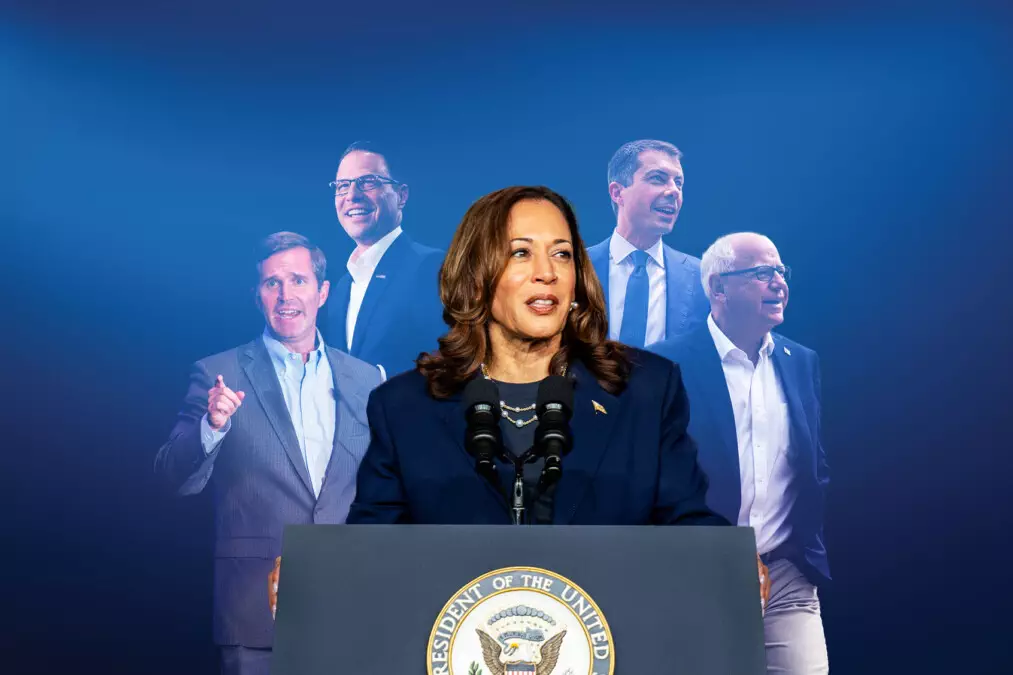Politics tamfitronics One meme shows a rack of wine at a supermarket labeled “Interesting Whites.” Another shows a different rack, this time labeled “Exciting Whites.” Yet another shows a menu, including “Light Crisp Dry Whites,” “Light–Medium-Bodied Off-Dry Whites,” and “Rich Whites.” The memes aren’t mocking the after-dinner selections of the suburban middle class, but lightly poking at Kamala Harris’ likely choices as a running mate.Several lists of potential hopefuls have been produced, and one thing is clear: Harris’ VP pick will be white and almost certainly a man.
We were here four years ago, when Joe Biden had pledged to select a woman of color as his running mate. But there is one noticeable difference. Biden had “boxed himself into a corner” and was “playing identity politics at its worst.” He was, the sentiment went,trapped by identity politics. That sentiment is notably absent today.Whatever is said about Harrisno one is complaining that she is seeking a diversity hire,except in jest. The disparity tells us something.
Somepunditshave tried for years to convince us that all politics is identity politics, insofar as all political calculations are made through the lens of some identity.K. Anthony AppiahandFrancis Fukuyamahave insisted that the grievance politics of straight white Christian men is just as much identity politics as any other form. And when it’s phrased in that way they have a point, or part of one. Clearly, though, their point hasn’t caught on.
A leading reason for the disparity in perception is that identity politics is frequently used as a derogatory term. It is leveled as an accusation, as if it were wrong to consider one’s own interests in voting, when those interests are tied to race, gender or some other key identity category. Identity politics, in common speech, is what other people do. This, in fact, is a key reason many want to seewhiteidentity politics called out.
But why should we think that selecting white candidates to satisfy white voters is identity politics in the first place? Much of the appeal comes from a liberal way of understanding equality. The same sentiment, for example, is behind the thought that affirmative action policies are just another form of racist discrimination. If identity politics is just a matter of “people evaluating issues through the lens of their association with a specific group,” then white men do it just as much anyone else.
What would be the point of identity politics as a category if all politics were identity politics? It may be more useful to think of identity politics not as something everyone does, but as a political strategy. The term itself comes fromThe Combahee River Collective Statementcompiled in 1977 by Black, mostly queer, feminists who argued for approaching politics throughtheiridentity because “the major systems of oppression are interlocking.” Breaking the systems of oppressiontheyfaced due to their identities, they argued, was a way of breaking the systems of oppressioneveryonefaces. And identifying one’s own oppression is the first step in building solidarity with others oppressed by the same systems.
Seen in this way, appointing white men to positions of power, even if done for political considerations that appeal to white identity, is not an instance of identity politics. When white people do it, they aren’t seeking to build solidarity or to remove anyone’s oppression. They are trying to maintain the status quo.
Still, shouldn’t we treat everyone equally and, as many liberals hold, consider all forms of group solidarity equivalent? Political philosophers sometimes make a distinction between ideal and non-ideal theory. Ideal theory tells us what a just world would look like and how people in such a world should act. Perhaps that would be a world where there are no groups at all, and people are evaluated only as individuals. Or perhaps it would be a world where groups exist, but all are treated equally. In either case, identity politics might be unnecessary, and anyone who engages in it would be equally blameworthy.
Want a daily wrap-up of all the news and commentary Salon has to offer? Subscribe to our morning newsletterCrash Course.
But since the real world doesn’t match the ideal, some argue, we also need non-ideal theory, which tells us how to act in light of ideals while taking account of our distance from them. In a world where groups are not treated equally, it makes sense for some to engage in a strategy — identity politics — to improve their position, bringing us closer to the ideal. But since not everyone’s pursuit of group advantagedoesbring us closer to the ideal, not every group-based politics is identity politics.
We are right, then, to consider Harris’ original selection as Joe Biden’s running mate in 2020 as a case of identity politics — and a perfectly legitimate one — but that her choice of running mate is unlikely to be. But if we draw that conclusion, we should do it for the right reasons.


